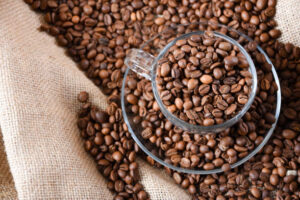There’s nothing worse than looking forward to your morning cup of coffee, only to be met with a sour taste. This can be disappointing and confusing, especially if you use high-quality beans. Understanding why your coffee tastes this way is the first step in fixing the problem and enjoying a perfectly brewed cup every time.
In this blog post, we’ll explore the main reasons behind that sour taste and provide practical solutions to help you achieve a delightful brew. Whether you’re a beginner or a seasoned coffee enthusiast, these insights will guide you toward a better understanding of your coffee.
Understanding Coffee Acidity
What Is Coffee Acidity?
Coffee acidity refers to the bright, tangy flavors that you might taste in your coffee. It’s different from the “sourness” we are addressing. Acidity in coffee is a desirable trait that adds complexity and liveliness to the flavor profile. However, if the acidity is too pronounced, it might come off as sour and unpleasant.
Good vs. Bad Acidity
Good acidity enhances the flavor, making your coffee taste fresh and vibrant. It’s often described as bright or lively. Bad acidity, on the other hand, results in a sour and unbalanced taste. This undesirable sourness is usually a sign of under-extraction or improper brewing techniques.
How to Identify Sour Coffee
Sour coffee will have a sharp, tangy taste that can be quite off-putting. It might also feel thin or lack the depth of flavor that you expect from a good cup of coffee. Understanding these characteristics can help you pinpoint the issue and take the necessary steps to correct it.
The Importance of Coffee Beans
Choosing the Right Beans
The type and quality of coffee beans play a crucial role in the taste of your coffee. Beans that are not properly roasted or are of low quality are more likely to produce a sour taste. Always opt for freshly roasted, high-quality beans from reputable sources.
Roasting Levels and Their Impact
Light roasts tend to have higher acidity levels, which can sometimes translate to a sour taste if not brewed correctly. Medium and dark roasts have lower acidity and a more balanced flavor profile. Experimenting with different roast levels can help you find the perfect balance for your taste preferences.
Storing Your Beans Properly
Proper storage of coffee beans is essential to maintain their freshness and flavor. Exposure to air, moisture, and light can degrade the beans, leading to sour and stale flavors. Store your beans in an airtight container in a cool, dark place to preserve their quality.
The Role of Water Quality
Why Water Matters
Water makes up about 98% of your coffee, so its quality can greatly affect the taste. Using tap water with high levels of chlorine or minerals can result in a sour and unpleasant brew. Always use filtered or bottled water to ensure the best possible taste.
Ideal Water Temperature
The temperature of the water used for brewing is another critical factor. Water that is too hot can over-extract the coffee, while water that is too cold can lead to under-extraction, causing sourness. The ideal brewing temperature is between 195°F and 205°F (90°C to 96°C).
Measuring Water-to-Coffee Ratio
Using the correct water-to-coffee ratio is vital for a balanced brew. Too much water can dilute the flavors, while too little can concentrate them, resulting in sourness. A general guideline is to use one to two tablespoons of coffee per six ounces of water, but feel free to adjust based on your taste preferences.
Brewing Methods and Techniques
Drip Coffee Makers
Drip coffee makers are popular for their convenience, but they can sometimes produce sour coffee if not used correctly. Make sure to use the right grind size, clean the machine regularly, and use fresh, filtered water to avoid sourness.
Pour-Over Technique
The pour-over method allows for greater control over the brewing process, which can help you achieve the perfect balance of flavors. Pour the water slowly and evenly over the coffee grounds, maintaining a consistent water temperature and flow rate to prevent sourness.
French Press Method
The French press is known for its rich and full-bodied coffee, but it can also be prone to sourness if not brewed properly. Use a coarse grind, steep for four minutes, and press the plunger down slowly and evenly to extract the best flavors without sourness.
The Impact of Grind Size
Why Grind Size Matters
Grind size directly affects the extraction process. If the grind is too coarse, the water will pass through too quickly, leading to under-extraction and a sour taste. If the grind is too fine, it can result in over-extraction, creating bitterness.
Finding the Right Grind Size
Each brewing method requires a specific grind size for optimal results. For drip coffee makers, a medium grind works best. Pour-over methods typically use a medium-fine grind, while the French press requires a coarse grind. Experimenting with different grind sizes can help you find the perfect balance.
Consistency Is Key
Consistent grind size is crucial for even extraction. Inconsistent grinds can lead to over-extraction of finer particles and under-extraction of coarser ones, resulting in a sour and unbalanced brew. Invest in a good quality burr grinder to achieve a uniform grind size.
The Brewing Time
Importance of Brewing Time
Brewing time is another critical factor that affects the taste of your coffee. If the coffee is brewed for too short a time, it will be under-extracted and sour. If brewed for too long, it can become over-extracted and bitter.
Optimal Brewing Times for Different Methods
Each brewing method has an optimal brewing time. For drip coffee makers, the brewing time typically ranges from 4 to 6 minutes. Pour-over methods usually take around 3 to 4 minutes, while the French press requires about 4 minutes of steeping time. Adjusting the brewing time can help you find the perfect balance.
Monitoring and Adjusting
Keep an eye on the brewing time and make adjustments as needed. If your coffee tastes sour, try extending the brewing time slightly. Conversely, if it tastes bitter, shorten the brewing time. Small adjustments can make a significant difference in the final taste.
The Role of Coffee Equipment
Cleanliness of Equipment
Regularly cleaning your coffee equipment is essential to prevent sour flavors. Residue from previous brews can build up and affect the taste of your coffee. Make sure to clean your coffee maker, grinder, and other equipment thoroughly and regularly.
Quality of Equipment
Investing in high-quality coffee equipment can significantly improve the taste of your coffee. A good grinder, for example, ensures a consistent grind size, while a reliable coffee maker maintains the right water temperature and brewing time. Quality equipment can make a noticeable difference in the final result.
Maintenance and Upkeep
Proper maintenance of your coffee equipment is crucial for consistent results. Regularly descaling your coffee maker, replacing filters, and checking for any wear and tear can help maintain the quality of your brews and prevent sourness.
The Influence of Coffee Freshness
Why Freshness Matters
Freshly roasted coffee beans have a more vibrant and complex flavor profile. Stale beans, on the other hand, can produce flat and sour-tasting coffee. Always use freshly roasted beans to ensure the best possible taste.
Identifying Fresh Beans
Look for coffee beans with a roast date on the packaging. Beans that are within 2 to 4 weeks of their roast date are considered fresh. Avoid beans that do not have a roast date or are well past their prime.
Storing Coffee Beans
Proper storage of coffee beans is essential to maintain their freshness. Store your beans in an airtight container in a cool, dark place. Avoid exposing them to air, moisture, light, or heat, as these factors can degrade the beans and lead to sour flavors.
Experimenting with Coffee Recipes
Trying Different Brewing Methods
Experimenting with various brewing methods can help you find the one that best suits your taste preferences. Each method extracts flavors differently, so trying different techniques can provide valuable insights into achieving the perfect brew.
Adjusting Variables
Small adjustments to variables like grind size, water temperature, and brewing time can have a significant impact on the final taste of your coffee. Don’t be afraid to experiment and make changes until you find the right balance.
Taking Notes
Keeping a coffee journal can help you track your experiments and identify what works best. Note down the details of each brew, including the type of beans, grind size, water temperature, brewing time, and any adjustments made. This practice can help you refine your technique and consistently achieve a great-tasting cup.
Common Mistakes to Avoid
Using Tap Water
Using tap water with high levels of chlorine or minerals can negatively affect the taste of your coffee. Always use filtered or bottled water to ensure the best possible flavor.
Incorrect Grind Size
Using the wrong grind size for your brewing method can lead to sour or bitter coffee. Make sure to use the appropriate grind size for your chosen brewing technique to achieve a balanced taste.
Rushing the Brewing Process
Brewing coffee requires patience and attention to detail. Rushing the process can result in under-extraction or over-extraction, leading to sour or bitter flavors. Take your time and follow the recommended brewing guidelines for the best results.
The Science Behind Sour Coffee
Understanding Acids in Coffee
Coffee contains various acids that contribute to its flavor profile. These include chlorogenic acid, citric acid, and malic acid, among others. While some acidity is desirable, an imbalance of these acids can result in a sour taste.
The Role of Extraction
Extraction is the process of dissolving coffee compounds in water. Proper extraction ensures a balanced flavor, while under-extraction or over-extraction can lead to sour or bitter coffee. Understanding the science behind extraction can help you achieve the perfect brew.
Factors Affecting Extraction
Several factors influence the extraction process, including grind size, water temperature, brewing time, and coffee-to-water ratio. By controlling these variables, you can optimize the extraction and achieve a well-balanced cup of coffee.
FAQs About Sour Coffee
Why does my coffee taste sour even with fresh beans?
Sour coffee can result from under-extraction, improper grind size, or incorrect brewing time. Make sure to use the right grind size, brewing time, and water temperature to achieve a balanced flavor.
Can water quality affect the taste of my coffee?
Yes, water quality plays a significant role in the taste of your coffee. Using filtered or bottled water can help prevent sour flavors caused by tap water with high levels of chlorine or minerals.
How can I fix sour coffee?
To fix sour coffee, try adjusting the grind size, extending the brewing time, or using hotter water. Small changes to these variables can help you achieve a more balanced and enjoyable cup of coffee.
Conclusion
Understanding why your coffee tastes sour is the first step towards mastering your brew. By paying attention to factors like bean quality, water temperature, grind size, and brewing time, you can achieve a perfectly balanced cup of coffee every time.
Remember, experimentation is key. Don’t be afraid to try different methods and make adjustments until you find the perfect balance for your taste preferences. With these insights and tips, you’ll be well on your way to enjoying a delicious and satisfying cup of coffee every day.






